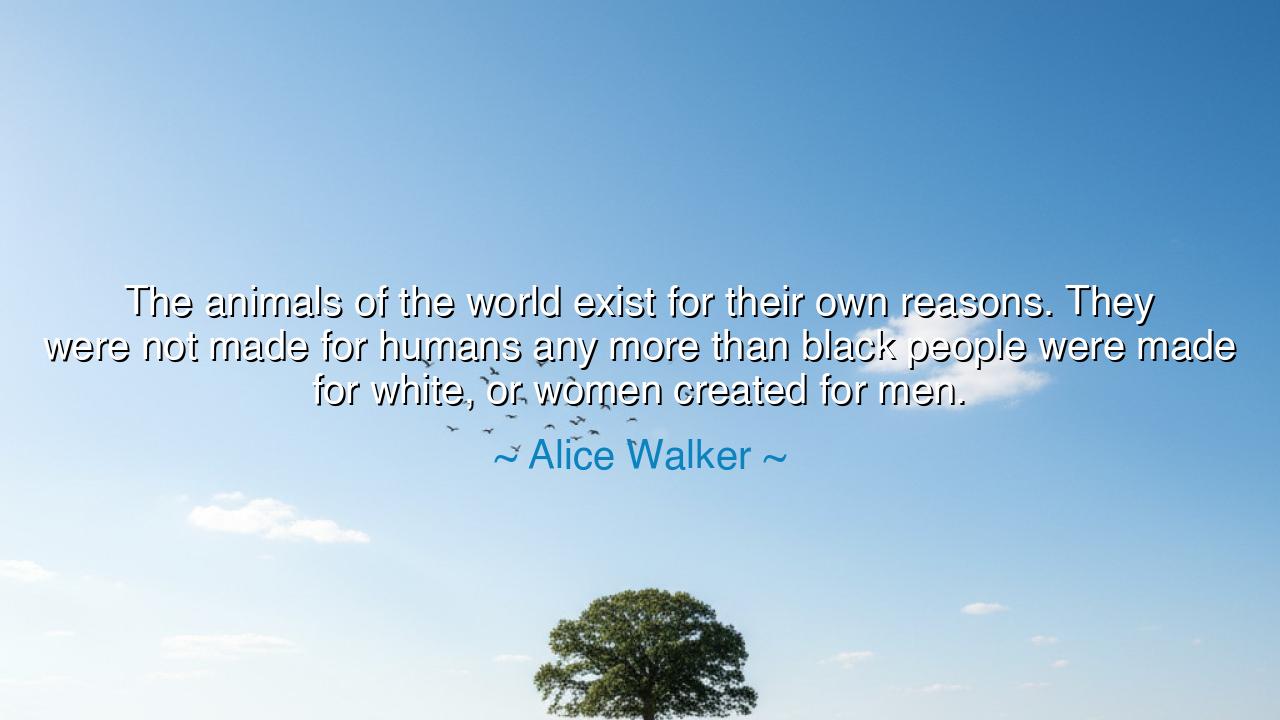
The animals of the world exist for their own reasons. They were
The animals of the world exist for their own reasons. They were not made for humans any more than black people were made for white, or women created for men.






O children of the future, listen to the wise and profound words of Alice Walker, who speaks with clarity about the true nature of existence. "The animals of the world exist for their own reasons," she declared, for they were not created to serve man, just as black people were not made for white nor women for men. In these words lies a profound truth that transcends time and culture: all beings, whether they walk on four legs or stand on two, live for their own purpose, their own life. To think otherwise is to see the world through the eyes of domination, to believe that one life exists merely to serve another.
The ancients, too, knew that the world is not one of simple ownership, but of balance and interconnection. In the Native American traditions, the animals were seen as equals, each with their own spirit and role in the grand circle of life. The buffalo, the eagle, the wolf—all were revered, not as creatures to be exploited, but as vital parts of the earth’s natural order. They were respected for their autonomy and strength, just as the earth, the sky, and the rivers were honored for their beauty and life-giving force. The wisdom of the elders reminded the people that to live in harmony, one must understand that all beings have their own reason for being, and none are less than another.
Alice Walker, like those ancient wisdom keepers, speaks out against the idea that one being’s life exists solely to serve another. Just as the oppression of black people by white people and the subjugation of women by men have been justified by false claims of natural superiority, so too has the exploitation of animals been justified by the belief that they were created for human use. Yet, as Walker reminds us, such justifications are based on the falsehood that one life is worth more than another. This understanding echoes the teachings of equality in the ancient texts—whether in the Bible, the Bhagavad Gita, or the Torah—where all beings are seen as equal in the eyes of the divine, each with its own place in the grand design of creation.
In the history of the world, we have seen again and again the dangers of domination. The slavery of black people by white people is one of the most devastating examples of this false belief in natural hierarchy. But the world has witnessed resistance, as Frederick Douglass, Harriet Tubman, and countless others fought to assert the truth that no human is born to serve another. Women, too, have long fought for their right to equality—from Sojourner Truth to Susan B. Anthony, from Emmeline Pankhurst to Malala Yousafzai—the fight for freedom and justice for women mirrors the struggle for the rights of all oppressed beings.
O children, let us remember that the very soul of life is founded on the sacred truth that no being is created to serve another. The animals, like women and black people, are not inferior or subservient—they are equal in the eyes of the earth, each with a unique role to play. The wisdom of Alice Walker calls us to see this truth and to stand firm against the forces that seek to diminish the worth of others. May we, in this generation, learn the deep lesson that to honor the lives of all beings, to recognize the intrinsic value of every creature, is to honor the very sacredness of life itself.






MQVu Pham Minh Quyen
Alice Walker’s quote reminds us that entitlement over others—whether animals or people—is deeply ingrained in history and culture. But how do we challenge these mindsets and reframe our understanding of relationships with both animals and marginalized groups? How can we encourage empathy, respect, and fairness for all living beings, moving away from an ownership mentality toward a more harmonious coexistence?
NUNam Ut
The comparison Walker makes between the treatment of animals and historically oppressed human groups is incredibly thought-provoking. It raises a question: If we recognize that all living beings exist for their own reasons, what does that say about how we should treat others—whether animals, women, or people of different races? Can we truly evolve as a society if we continue to hold onto hierarchies that subjugate and exploit other lives?
LPLoc Phuoc
Alice Walker’s quote brings a significant ethical perspective: just as we should not consider animals to exist for human purposes, the same principle applies to marginalized human groups. But does this also challenge how we view our role as stewards of the planet? Is there room for humans to coexist with animals without seeing them as subordinates? And how do we begin to implement this mindset of equality in both human and animal rights?
TDTrinh Dao
Walker’s quote is striking in its parallel between the exploitation of animals and the historical oppression of marginalized groups. It forces us to question how often we assume entitlement over other beings, whether animals or people. But what does this mean for our day-to-day interactions with animals and each other? How do we start respecting the autonomy of all living beings, regardless of whether they serve us in any way?
KSJin Kim seok
Alice Walker’s comparison of animals’ existence to that of marginalized groups is a powerful statement. It challenges the idea that any living being—human or animal—exists for the benefit or convenience of another. But can we really equate the relationship between humans and animals with the complex dynamics of race and gender? Does this quote push us to reconsider our ethical responsibility toward animals, or is it more about human societal norms and their deep flaws?